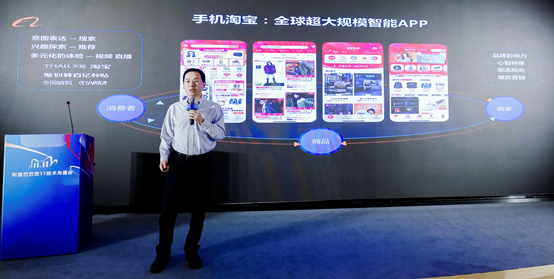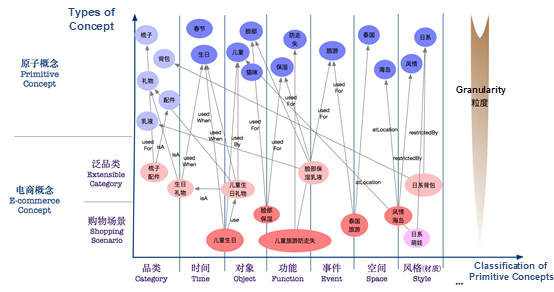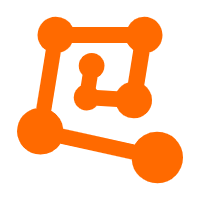The Alibaba Cloud 2021 Double 11 Cloud Services Sale is live now! For a limited time only you can turbocharge your cloud journey with core Alibaba Cloud products available from just $1, while you can win up to $1,111 in cash plus $1,111 in Alibaba Cloud credits in the Number Guessing Contest.
To meet the commodity demand of trillions of consumers during the Double 11 shopping festival, Taobao has created a series of new-generation intelligent technology, turning Taobao itself into an ultra-large-scale intelligent application. Now, with this advanced technology, Taobao is hoping to reshape the relationship among consumers, products, and the market for the 2020 Double 11 shopping festival and beyond.

Figure: Taobao Mobile has become an ultra-large-scale intelligent application
"Taobao Mobile has become an ultra-large-scale intelligent app," said Zhou Jingren, the senior vice president at Alibaba Group, on November 3, 2020. Based on the world's largest product perceptual maps and the world's first cloud-based collaborative graph neural network with trillion-scale query daily, the scale and efficiency of intelligent computing in Double 11 this year has made historical record again.
At the technical communication meeting for Double 11, Cheng Li, the chief technology officer (CTO) of Alibaba, believed that the intelligent middle platform is an important part of Alibaba's digital-native operating system. Intelligent technology is flowing through economies like water. Subsequently, Alibaba announced for the first time that it has built a cognitive intelligence engine that includes a global knowledge layer, a cognitive reasoning layer, and a user interaction layer in its core business technology architecture.
With the coming Double 11 this year, the Taobao homepage was greatly revised. In user scenarios such as information flow, search, Juhuasuan, Taobao venue, and live streaming, the number of calls to intelligent computing per day has reached hundreds of billions. Therefore, consumer interests are expanding significantly, opportunities for businesses are diversifying and incubation cycles for new commodities are shortening.
In addition, various basic intelligent technologies have been widely used on Taobao, with hundreds of billions of calls per day. In the field of visual artificial intelligence (AI), Pailitao currently supports image and video retrieval of 400 million products. Technologies such as natural language learning (NLP), real-time machine translation, and semantic recognition are applied to key processes such as AlimeBot, real-time translation, and the analysis of product reviews.
In the fields of information search, recommendation, and marketing, traditional machine learning mechanism will continuously fit the data on user behavior. At the same time, cognitive intelligence enables the machine to discover more things.
Cognitive intelligence requires "real-time training" and "thousands of times of simulations". The system of computing engineering, while facing the challenges in improving efficiency and lowering costs, are protecting user data by using differential mechanisms and device-side operations. According to Zhou Jingren, Alibaba now uses its in-house artificial intelligence operating system (AIOS) and graph computing framework and integrates online learning models with a high compression ratio. So, Alibaba can support floating-point computation of models that are with an upgrading of 100 million parameters within minutes and more than 20 billion requests per second.

Figure: Basic structure of the product perceptual maps
When Alibaba went public in 2014, deep learning and proprietary algorithms were two of the core technologies open to the public. In 2016, the concept of "five new", including new retail, new manufacturing, and new energy, was proposed and began to adopt intelligent technologies. In 2017, the Alibaba DAMO Academy was established, which has exported more than 200 kinds of intelligent technology to different business scenarios, with more than 500 billion calls daily.
Meanwhile, Alibaba has introduced needed scientists from various fields globally to carry out cutting-edge basic scientific researches such as automatic learning, distributed computing, multi-modal understanding, graph computing, differential privacy. Also Alibaba actively supports technical verification, integration, and promotion in core business scenarios. For example, in the fields related to cognitive intelligence, Alibaba has published more than 300 papers at top conferences in the world and registered more than 180 patents in China and the rest of the world.
Frontend Technology behind Tmall's Record-Breaking US$74.1 Billion GMV

2,593 posts | 791 followers
FollowAlibaba Clouder - December 1, 2020
Alibaba Clouder - November 27, 2018
Data Geek - February 8, 2025
Alibaba Clouder - May 11, 2020
Alibaba Clouder - November 3, 2017
Alibaba Clouder - April 1, 2021

2,593 posts | 791 followers
Follow Platform For AI
Platform For AI
A platform that provides enterprise-level data modeling services based on machine learning algorithms to quickly meet your needs for data-driven operations.
Learn More Epidemic Prediction Solution
Epidemic Prediction Solution
This technology can be used to predict the spread of COVID-19 and help decision makers evaluate the impact of various prevention and control measures on the development of the epidemic.
Learn More Livestreaming for E-Commerce Solution
Livestreaming for E-Commerce Solution
Set up an all-in-one live shopping platform quickly and simply and bring the in-person shopping experience to online audiences through a fast and reliable global network
Learn More E-Commerce Solution
E-Commerce Solution
Alibaba Cloud e-commerce solutions offer a suite of cloud computing and big data services.
Learn MoreMore Posts by Alibaba Clouder